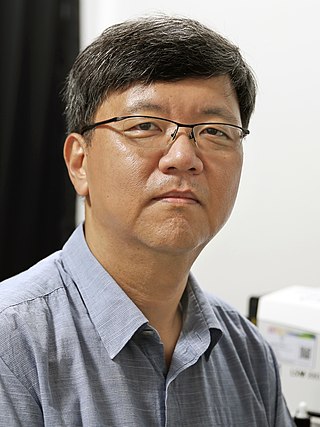Related Research Articles

Carolyn Ruth Bertozzi is an American chemist and Nobel laureate, known for her wide-ranging work spanning both chemistry and biology. She coined the term "bioorthogonal chemistry" for chemical reactions compatible with living systems. Her recent efforts include synthesis of chemical tools to study cell surface sugars called glycans and how they affect diseases such as cancer, inflammation, and viral infections like COVID-19. At Stanford University, she holds the Anne T. and Robert M. Bass Professorship in the School of Humanities and Sciences. Bertozzi is also an Investigator at the Howard Hughes Medical Institute (HHMI) and is the former director of the Molecular Foundry, a nanoscience research center at Lawrence Berkeley National Laboratory.

Gregory A. Petsko is an American biochemist and member of the National Academy of Sciences, the National Academy of Medicine, the American Academy of Arts and Sciences, and the American Philosophical Society. He is currently Professor of Neurology at the Ann Romney Center for Neurologic Diseases at Harvard Medical School and Brigham and Women's Hospital. He formerly had an endowed professorship in Neurology and Neuroscience at Weill Cornell Medical College and is still an adjunct professor of Biomedical Engineering at Cornell University, and is also the Gyula and Katica Tauber Professor, Emeritus, in biochemistry and chemistry at Brandeis University. On October 24, 2023, in a ceremony in the East Room of the White House, President Joe Biden presented Gregory Petsko and eight others with the National Medal of Science, the highest honor the United States can bestow on a scientist and engineer.
Lynn William Enquist is professor emeritus in molecular biology at Princeton University, as well as founding editor of the journal Annual Review of Virology. His research focuses on neuroinvasive alpha-herpesviruses.

Scott D. Emr is an American cell biologist and the founding and current Director of the Weill Institute for Cell and Molecular Biology at Cornell University, where he is also a Frank H.T. Rhodes Class of 1956 Professor at the Department of Molecular Biology and Genetics.

Jennifer Lippincott-Schwartz is a Senior Group Leader at Howard Hughes Medical Institute's Janelia Research Campus and a founding member of the Neuronal Cell Biology Program at Janelia. Previously, she was the Chief of the Section on Organelle Biology in the Cell Biology and Metabolism Program, in the Division of Intramural Research in the Eunice Kennedy Shriver National Institute of Child Health and Human Development at the National Institutes of Health from 1993 to 2016. Lippincott-Schwartz received her PhD from Johns Hopkins University, and performed post-doctoral training with Richard Klausner at the NICHD, NIH in Bethesda, Maryland.

Harvey Franklin Lodish is a molecular and cell biologist, professor at the Massachusetts Institute of Technology (MIT), Founding Member of the Whitehead Institute for Biomedical Research, and lead author of the textbook Molecular Cell Biology. Lodish's research focused on cell surface proteins and other important areas at the interface between molecular cell biology and medicine.
Utpal Banerjee is a distinguished professor of the department of molecular, cell and developmental biology at UCLA. He obtained his Bachelor of Science degree in chemistry from St. Stephen's College, Delhi University, India and obtained his Master of Science degree in physical chemistry from the Indian Institute of Technology, Kanpur, India. In 1984, he obtained a PhD in chemistry from the California Institute of Technology where he was also a postdoctoral Fellow in the laboratory of Seymour Benzer from 1984-1988.

Thomas Christian Südhof, ForMemRS, is a German-American biochemist known for his study of synaptic transmission. Currently, he is a professor in the school of medicine in the department of molecular and cellular physiology, and by courtesy in neurology, and in psychiatry and behavioral sciences at Stanford University.
John A. Pollock, is a Full Professor of Biological Science at Duquesne University Bayer School of Natural and Environmental Sciences, where he researches and teaches molecular neurobiology. He is Principal Investigator for The Partnership in Education, a non-profit multidisciplinary health literacy and informal science education project at Duquesne University funded primarily through a Science Education Partnership Award(SEPA) from the National Institute of General Medical Sciences, a component of the National Institutes of Health.
The Bruce Alberts Award for Excellence in Science Education is awarded annual by the American Society for Cell Biology. It is awarded to an individual who has demonstrated innovative and sustained contributions to science education, with particular emphasis on the broad local, regional, and/or national impact.
Robert D. Goldman is an American cell and molecular biologist. He was the Chair of the Department of Cell and Molecular Biology at Northwestern University Feinberg School of Medicine. He held the Stephen Walter Ranson Professor of Cell Biology at the institution. He is currently a professor of Cell and Developmental Biology at Feinberg.

Rocky Tuan Sung-chi is a Hong Kong medical researcher and bioengineer. He is currently the vice-chancellor and president of the Chinese University of Hong Kong (CUHK), where he served as distinguished visiting professor and director of the Institute for Tissue Engineering and Regenerative Medicine prior to taking up the vice-chancellorship. Tuan is set to step down as vice-chancellor and president in January 2025 following his earlier resignation; he is to be succeeded by Dennis Lo.

Daniel Alfonso Colón-Ramos is the McConnell Duberg Professor of Neuroscience and Cell Biology at Yale University School of Medicine, where his lab studies the cell biology of the synapse during development and learning. He is also the founder of the nonprofit organization Ciencia Puerto Rico (CienciaPR), a collaborative network for people interested in science and Puerto Rico. In 2020, he was named to the National Academy of Medicine.
The Elizabeth W. Jones Award for Excellence in Education is awarded annually by the Genetics Society of America to recognize individuals who have made noteworthy contributions to genetics education. It was founded in 2007 as the Genetics Society of America Award for Excellence in Education. Its first recipient was Elizabeth W. Jones, after whom the award was renamed following her death in 2008.

Myung Kyungjae is a biologist researching DNA repair pathways at the molecular level. He is a Distinguished Professor at the Ulsan National Institute of Science and Technology (UNIST) and the Director of the IBS Center for Genomic Integrity located on the UNIST campus. He is on the editorial board of various peer-reviewed journals and is a member of multiple scientific societies.

Elba E. Serrano is a neuroscientist and biophysicist who holds a position as a Regent's Professor of Biology at New Mexico State University.

Denise Johnson Montell is an American biologist who is the Duggan Professor of Molecular, Cellular, and Developmental Biology at the University of California, Santa Barbara. Her research considers the oogenesis process in Drosophila and border cell migration. She has served as president of the Genetics Society of America and was elected to the National Academy of Sciences in 2021.

David G. Drubin is an American biologist, academic, and researcher. He is a Distinguished Professor of Cell and Developmental Biology at the University of California, Berkeley where he holds the Ernette Comby Chair in Microbiology.
Martin Hetzer is an Austrian-born molecular biologist and President of the Institute of Science and Technology Austria (ISTA). He is holder of the Jesse and Caryl Philips Foundation Chair in Molecular Cell Biology. His research focuses on fundamental aspects of organismal aging with a special focus on the heart and central nervous system. His laboratory has also made important contributions in the area of cancer research and cell differentiation.
Margaret Ransone Murray was an American scientist known primarily for her work on methods to establish cultures of neuronal cells. Her in vitro studies in cellular neurobiology shed light on both nerve- muscle relationships and axon myelination.
References
- 1 2 3 Science, Carnegie (2014-11-12). "Steven Farber". Carnegie Institution for Science. Retrieved 2018-12-26.
- 1 2 Farber, Steven Arthur (1993). Neuronal activity and membrane turnover in rat brain (Thesis thesis). Massachusetts Institute of Technology. hdl:1721.1/12673.
- ↑ https://bio.jhu.edu/directory/steven-farber/
- ↑ Science, Carnegie (2018-10-10). "Steven Farber Awarded $3.3-Million NIH Grant To Identify New Pharmaceuticals To Fight Cardiovascular Disease". Carnegie Institution for Science. Retrieved 2018-12-26.
- 1 2 "Genetics Society of America honors Steven Farber and Jamie Shuda with 2018 Elizabeth W. Jones Award for Excellence in Education". Genetics Society of America. Retrieved 5 February 2020.
- ↑ https://www.nytimes.com/2008/07/29/science/29conv.html
- ↑ https://www.the-scientist.com/making-outreach-work-46836
- ↑ "Cell biology, microbiology societies present awards". American Society for Cell Biology. Retrieved 10 November 2024.